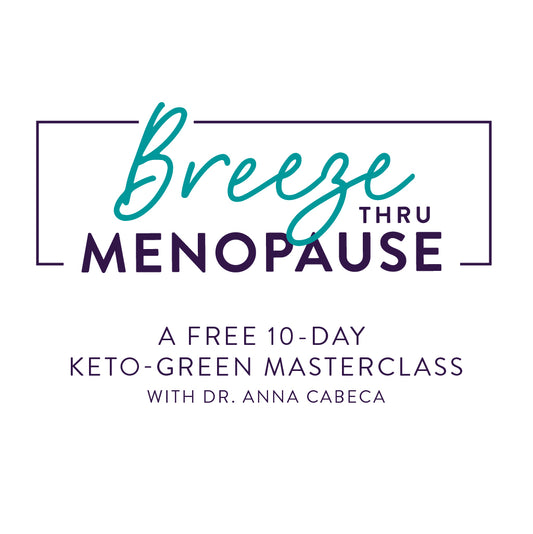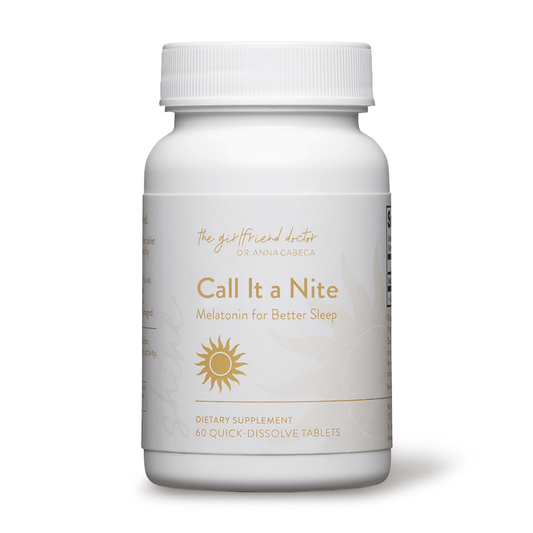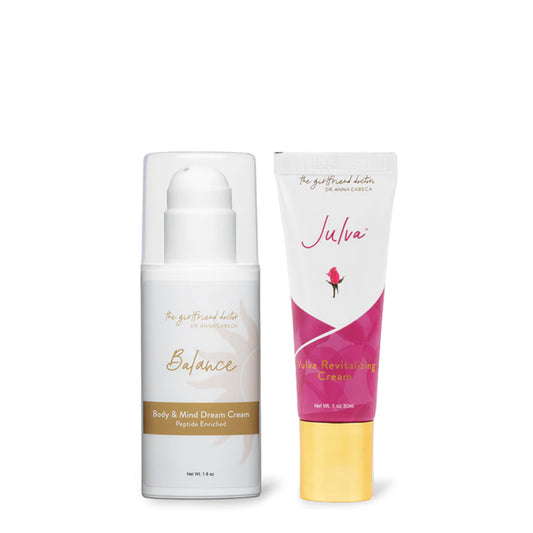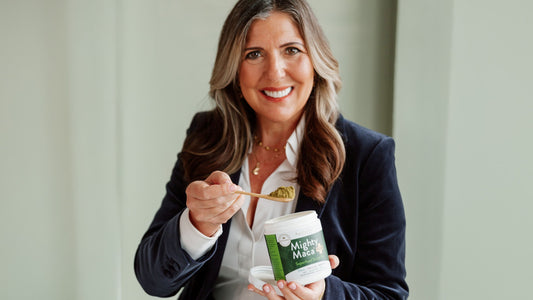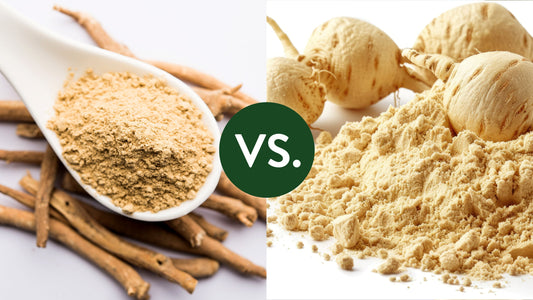Menopause and bone density. It’s not exactly a fun topic, but it’s one we need to discuss, Girlfriend. Sure, the glaring, obvious menopause struggles, like hot flashes and mood swings get our full attention. You can’t ignore them! Bone loss in menopause happens quietly and often doesn’t demand consideration until a bone fractures.
Which is a very real problem…because what you do to improve bone density now has an outsized impact on the strength of your bones later. And once osteoporosis and bone loss have set in, it’s difficult to reverse.
It’s so much better to take a proactive approach to bone loss during menopause, rather than wait and prioritize it after there’s a problem.
Let’s take a look at why you should make your bones a priority now, and how to improve bone density in menopause.

Bone Loss + Menopause
The older you get, the higher your risk of bone fracture, that’s just a fact of life. But did you know that 4 to 5 in 10 women in the United States over the age of 50 will experience a fracture in their hip, spine, or wrist sometime during the remainder of their lives? And the statistics don’t get any prettier (1):
Osteoporosis is the most common cause of these fractures
10 million people 50+ have osteoporosis
33.6 million have osteopenia, or low bone mass (not quite full-blown osteoporosis)
How Does Menopause Affect Bone Density?
Unfortunately, menopause significantly impacts bone density. As you can probably guess, it is due to a decline in estrogen levels. Estrogen serves an important role in bone health, and once it’s gone, your bones notice.
You see, estrogen helps your body with both bone formation and bone resorption (the process by which bone is broken down). This is why menopause and bone density loss tend to go hand in hand.
Here’s what happens. (2)
With lower estrogen levels, the rate of bone resorption increases. Osteoclasts, the cells responsible for breaking down bone tissue, become more active, which leads to greater bone loss.
Then you have the osteoblasts. Those are the cells that form new bone, and they’re also affected by reduced estrogen levels. This results in decreased ability to form new bone to replace what is lost.
The combined effect of increased bone resorption and decreased bone formation leads to accelerated bone loss, especially in the first few years after menopause. Most estimates say you lose 5-10% of your bone density during late perimenopause and into early menopause. (3)
Once you’re postmenopausal, bone density can significantly decrease. Postmenopausal women are at a higher risk of developing osteoporosis, a condition that causes weak and brittle bones.
This increases the likelihood of fractures, particularly in the hips, spine, and wrists.
Bone Fractures Menopause
Here’s why that’s such a big deal. When you break a bone like your hip or your spine, in most cases, it takes away your independence for the rest of your life.
Only 33% of women who experience a hip fracture are able to return to independent living.
I don’t say this to scare you. But it really underscores the importance of taking care of your bones in any possible way you can, as soon as you possibly can.
Asymptomatic Menopausal State Bone Density
It’s interesting that there might be a relationship between the severity of your menopausal symptoms and your bone density.
One older study showed that the more intense symptoms like hot flashes were for women, the more likely they were to also have a higher risk of low bone mineral density in menopause. And vice versa — the more “asymptomatic” a woman’s menopause experience was, the better their bone density. (4)
And, it’s also important to note that the age you go through menopause makes a difference to your bone health, too. Studies indicate early menopause, either from hysterectomy or not, is tied to an increased risk of osteoporosis. (5)
If you’d like some help tackling the worst of your menopause symptoms, be sure to take my FREE Breeze Through Menopause 10-day class. It’s an amazing jumpstart for your hormones and your health. Learn more here.
How To Improve Bone Density In Menopause
The good news is you don’t have to just sit back and wait for menopause to destroy your bone density.
If you take a proactive approach, you can improve bone health naturally, and hopefully, stay far away from those bone fractures we all fear so much.
Here are my top recommendations to maintain bone density after menopause.

1. Calcium
You’ve probably heard that calcium is important for your bones. But are you getting enough of it through your diet daily? Or are you eating the standard American diet, which leaves about 60% of women without adequate intake? (6)
Dairy isn’t your only option when it comes to calcium, either. Many fruits like kiwi and bananas are packed with calcium. And vegetables like spinach, broccoli, and leafy greens in general are fantastic calcium sources.
For a delicious “bone-building cocktail” with 212 mg of plant-based calcium, try this recipe .

2. Vitamin D
Vitamin D is also essential for bone health. While you can get vitamin D from both the sun and your diet, as you age, it becomes harder for you to do both of these things. A lot of women are woefully low in vitamin D, and supplementation is important in this instance.
Just be sure that if you do need to supplement, you get a vitamin D3-K2 blend that combines both vitamin D3 and K2 to make sure don’t get a buildup of calcium in your blood, instead of in your bones where you want it.

3. Weight-Bearing Exercise
Yes, you can improve bone density with exercise. Weight-bearing activities like walking, jogging, and strength training help maintain bone density by stimulating bone formation. (7) In fact, several studies suggest that resistance exercises undertaken two to three times a week for one year showed maintenance or increase of bone mineral density at the lumbar spine and hip in postmenopausal women. (8)
So don’t put it off any longer, it’s time to start that exercise regimen, Girlfriend! Here are a few ideas for fitness routines I think you’ll love.

If you’re struggling with bone density in menopause, your doctor has several options they may want to discuss with you. There are several medications that can help slow bone loss and increase bone density. These include bisphosphonates, selective estrogen receptor modulators (SERMs), and hormone replacement therapy (HRT).

If you’re a smoker or drinker and your bone health is important to you, it’s time to think about changing your habits. Avoiding smoking and excessive alcohol consumption can help protect bone health. Tobacco use decreases calcium absorption and creates a greater risk for fractures. And that goes for men, too. (9)

6. Regular Check-ups
Regular bone density tests and consultations with healthcare providers can help monitor bone health and take appropriate actions if needed. While recommendations vary, ideally, you should have a bone mineral density (BMD) test called a dual-energy X-ray absorptiometry (DXA or DEXA scan), routinely. If you’re at higher risk for osteoporosis, you will want to start scanning earlier, after the age of 50. (10)
Menopause And Bone Density: Key Takeaways
It’s important to feel empowered, not fearful, about the relationship between menopause and bone density.
After all, there are so many things you can do to take control of your health and your menopause experience.
For help taking control, be sure to try my free 10-day hormone jumpstart, Breeze Through Menopause class. It will lead you through some of the simplest diet and lifestyle changes you can make that have the largest impact on your health and hormones. Really see a difference in just 10 days! Click here to learn more.

